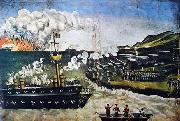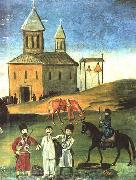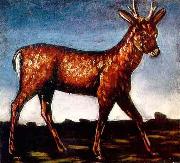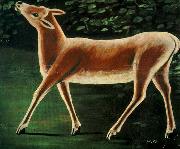Niko Pirosmanashvili Huiler la Reproduction de TableauAll Niko Pirosmanashvili Oil Paintings(born Niko Pirosmanashvili; May 5, 1862-1918) was a Georgian primitivist painter. Pirosmani was born in the Georgian village of Mirzaani to a pleasant family in the Kakheti province. His family owned a small vineyard. He was later orphaned and put in the care of his two elder sisters. He moved with them to Tbilisi in 1870. In 1872 he worked as a servant for wealthy families and learned to read and write Russian and Georgian. In 1876 he returned to Mirzaani and worked as a herdsman. Pirosmani gradually taught himself to paint. One of his specialties was painting directly into black oilcloth. In 1882 he opened a workshop in Tbilisi which was unsuccessful. In 1890 he worked as a railroad conductor, and in 1895 worked creating signboards. In 1893 he co-founded a dairy farm in Tbilisi which he left in 1901. Throughout his life Pirosmani, who was always poor, was willing to take up ordinary jobs including housepainting and whitewashing buildings. Although his paintings had some local popularity (about 200 survive) his relationship with professional artists remained uneasy; making a living was always more important to him than abstract aesthetics. |
|||

|
|||
|
|
|||
|
||||||||||||
| Niko Pirosmanashvili (born Niko Pirosmanashvili; May 5, 1862-1918) was a Georgian primitivist painter. Pirosmani was born in the Georgian village of Mirzaani to a pleasant family in the Kakheti province. His family owned a small vineyard. He was later orphaned and put in the care of his two elder sisters. He moved with them to Tbilisi in 1870. In 1872 he worked as a servant for wealthy families and learned to read and write Russian and Georgian. In 1876 he returned to Mirzaani and worked as a herdsman. Pirosmani gradually taught himself to paint. One of his specialties was painting directly into black oilcloth. In 1882 he opened a workshop in Tbilisi which was unsuccessful. In 1890 he worked as a railroad conductor, and in 1895 worked creating signboards. In 1893 he co-founded a dairy farm in Tbilisi which he left in 1901. Throughout his life Pirosmani, who was always poor, was willing to take up ordinary jobs including housepainting and whitewashing buildings. Although his paintings had some local popularity (about 200 survive) his relationship with professional artists remained uneasy; making a living was always more important to him than abstract aesthetics. |
||||||||||||
|
|
||||||||||||
| ID de tableau:: 96068 The Russo-Japanese War The Russo-Japanese War 131 x 103 cm (51.6 x 40.6 in) Oil painting on oilcloth pre 1919 cjr 131 x 103 cm (51.6 x 40.6 in) Oil painting on oilcloth pre 1919 cjr |
||||||||||||
|
|
||||||||||||
| ID de tableau:: 96070 Kakhetian Epos - Alasan Valley Kakhetian Epos - Alasan Valley 1895-1906 Medium Oil painting on oilcloth cjr 1895-1906 Medium Oil painting on oilcloth cjr |
||||||||||||
|
|
||||||||||||
| ID de tableau:: 96188 Walking Gazelle Walking Gazelle 62 X 55 cm (24.4 X 21.7 in) c. 1909 Medium English: Oil painting on oilcloth cjr 62 X 55 cm (24.4 X 21.7 in) c. 1909 Medium English: Oil painting on oilcloth cjr |
||||||||||||
|
|
||||||||||||
| ID de tableau:: 96272 A Doe Walking A Doe Walking 68 X 82 cm (26.8 X 32.3 in) Oil painting on cardboard 1900s(1900s) cjr 68 X 82 cm (26.8 X 32.3 in) Oil painting on cardboard 1900s(1900s) cjr |
||||||||||||
|
|
||||||||||||
| ID de tableau:: 96273 Organ-Grinder Organ-Grinder pre 1919 Medium oil on oilcloth Dimensions 47 X 107 cm (18.5 X 42.1 in) cjr pre 1919 Medium oil on oilcloth Dimensions 47 X 107 cm (18.5 X 42.1 in) cjr |
||||||||||||
|
|
||||||||||||
| Artiste précédent Artiste prochain | ||||||||||||
|
|
||||||||||||
|
Niko Pirosmanashvili (born Niko Pirosmanashvili; May 5, 1862-1918) was a Georgian primitivist painter. Pirosmani was born in the Georgian village of Mirzaani to a pleasant family in the Kakheti province. His family owned a small vineyard. He was later orphaned and put in the care of his two elder sisters. He moved with them to Tbilisi in 1870. In 1872 he worked as a servant for wealthy families and learned to read and write Russian and Georgian. In 1876 he returned to Mirzaani and worked as a herdsman. Pirosmani gradually taught himself to paint. One of his specialties was painting directly into black oilcloth. In 1882 he opened a workshop in Tbilisi which was unsuccessful. In 1890 he worked as a railroad conductor, and in 1895 worked creating signboards. In 1893 he co-founded a dairy farm in Tbilisi which he left in 1901. Throughout his life Pirosmani, who was always poor, was willing to take up ordinary jobs including housepainting and whitewashing buildings. Although his paintings had some local popularity (about 200 survive) his relationship with professional artists remained uneasy; making a living was always more important to him than abstract aesthetics. |
||||||||||||
|
|
||||||||||||
|
CONTACTER DES Etats-Unis |










